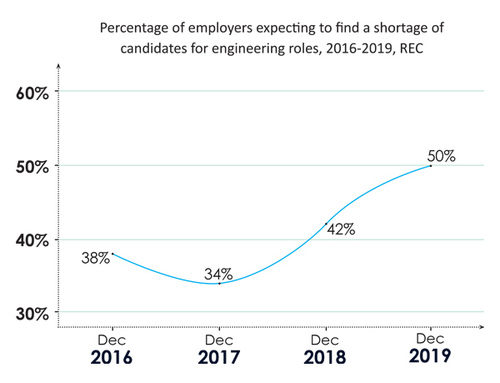It is no coincidence that when it comes to filling permanent vacancies, UK employers have consistently voted engineering and technical in the top three most challenging functions (you can see a list of the latest engineering jobs that are available right now by clicking here.) Figures reported by the Recruitment Employment Confederation (REC)JobsOutlook monthly report, suggest that concern has been rising steadily over recent years:

BUT WHAT DOES IT MEAN FOR THE INDUSTRIES WHICH DEPEND UPON THE SKILLS OF ENGINEERS?
Engineering UK: The State of Engineering 2019 report forecasts:
-
An annual demand for 124,000 engineers and technicians with core engineering skills across the economy, alongside an additional requirement for 79,000 ‘related’ roles requiring a mixed application of engineering knowledge and skill alongside other skill sets.
-
A shortfall of between 37,000 and 59,000 in meeting the annual demand for core engineering roles requiring level 3+ skills
-
Job openings in engineering representing 17.1% of all vacancies (2.5 million), with just under 10% of these expected to be from expansion demand
-
Between 2014 and 2024, 13 million job openings will open up across the economy as a result of those who leave the labour market (replacement demand) and a further 1.8 million openings will arise from newly created jobs (expansion demand)
WHY ARE ENGINEERS IN DEMAND?
-
Despite Brexit and economic uncertainty, engineering and manufacturing remains a cornerstone to the UK economy, generating 21.4% (£1.2 trillion) of the UK’s £5.7 trillion GDP in 2018 (Engineering UK 2019). Historically, many innovative products have been devised, developed and made in the UK, attracting large multinationals including the likes of Boeing and Jaguar Land Rover to base operations in the UK. They are supported by a network of suppliers and advanced tech clusters – all of which rely on a skilled workforce.
-
The UK’s industrial strategy, four grand challenges and commitment to zero emission targets are not only challenging the UK to increase productivity but are also serving to boost investment in skills, industries and infrastructure. High-profile projects naturally create high demand for engineers and we’re certainly seeing this translating into job vacancies supporting government backed initiatives.
-
Linking to the industrial strategy (to become world leaders in these tech developments), a new wave of technologies and start-ups are disrupting industry, resulting in the creation of new industries and job roles. In particular, we are seeing new roles created within software, future mobility, electronics, data analytics, cyber security, artificial intelligence (AI), advanced materials, automation and robotics.

WHAT’S THE REASON BEHIND THE SHORTAGE OF ENGINEERS IN THE UK?
There is no single reason that accounts for the shortage of engineers; it is being driven by a complex mix of interlinking factors:
1. Identity problem
The engineering industry has been plagued by an outdated image of spanners and dirty overalls for years, if not decades. Engineering careers simply do not resonate with the Insta, filter-loving, Snapchat generation. However, initiatives such of Year of Engineering, Tomorrow’s Engineers Week, Tech She Can, STEM ambassadors, Business Enterprise Advisors and the implementation of Gatsby Benchmarks are shaking up people’s ideas about engineering. The aim – to inspire the next generation of innovators, inventors and problem solvers by showing them what engineers actually do.
Perceptions are certainly changing, Engineering UK’ and Engineering Brand Monitor (EBM) annual survey reveals that improving overall understanding and knowledge of engineering is now attracting more students into the profession, but that it is still lagging behind science and technology in terms of perceived desirability as a career.
Another sticking point has been the lack of diversity within the engineering industry. There are striking gender differences in take-up of some GCSE STEM subjects, including engineering (10.5% female), computing (20.2% female), design and technology (32.9% female) and ICT (37.0% female) (Engineering UK). Encouragingly, more is being done to promote inclusion – removing barriers that can obstruct people from entering the profession, reaching their potential or rising to the top.
2. Education
The decline of apprenticeships from the mid-1970s has almost certainly contributed to today’s skills shortage, and the situation is not helped when, in the past at least, engineering courses have left students ill-equipped for the workplace. Prospects 2018-2019 statistics show that 5.6% of engineering graduates remain unemployed after graduation, while a further 10% end up in a role that either doesn’t require a degree or is not relevant to their qualification.
Most would argue that action is being taken to curb this trend. Businesses, industry bodies, government and academia are working collaboratively to formulate relevant training that adapts as new technology evolves. Good examples of this include MIRA Technology Institute (MTI), Make UK Technology Hub and Birmingham Centre for Railway Research Education (BCRRE). T-Levels will also be available from autumn 2020, which will include a compulsory three-month industry placement and final exams (similar to A Levels), offering a mix of classroom learning and ‘on-the-job’, more practical training.
Apprenticeships are certainly high on the agenda and aim to improve the quality and quantity of courses available. Whether it’s addressing the skills shortage as quickly as hoped is questionable. Ofsted report that there has been a high proportion of apprenticeship course intake in management and health disciplines, which mismatches with the actual skills shortages identified in the industrial strategy – and so ultimately not providing the UK’s future skills needs. Again, this links to the overall identity issue of engineering; young people are potentially being cheated of the skills needed to get good jobs by understanding neither the vast opportunities available in engineering nor the high-level future earning potential.
3. Aging workforce
The skills shortage is exacerbated by the impending retirement of an aging workforce.19.5% of engineers currently working in the UK are due to retire by 2026, leaving a skills, knowledge and experience gap.
4. Economic factors
The credit crunch left many businesses having to reduce their head count and, in the process, many engineers moved out of the industry to ride out the recession. When the sectors picked up, many did not return and skills were lost or became outdated. During the same period, employers reduced the number of entry level positions, opening skills gaps in the long run.
5. Employer brands struggling to compete
Attracting the best and brightest minds is a key part of the puzzle and this again has its roots in the perception of engineering as a career option. In a competitive market, other industries have won the war for talent by building stronger employer brands.
Historically, many highly successful engineering companies have not effectively promoted themselves to candidates, with their websites not reflecting their market position, the exciting nature of the work or the culture and working practices, hindering brand perception and potentially putting off candidates.
Business websites have a vital role to play in recruitment as the company shop-window; it’s critical that businesses market themselves professionally, making them highly attractive to the talent pool.
6. Inflexible approach to talent acquisition
Employers almost always specify previous sector or product experience when going out to the candidate market. It’s true that, in times past, this specialist approach has delivered the people they want. Increasingly, with digitalisation and Industry 4.0 influencing engineering, there are huge opportunities to look at transferability of skills, making the most of talent from other industries and sectors.
Those industries and businesses adopting a more flexible approach to job specifications will often find ‘the diamond in the rough’ by nature of widening their talent pool. In a skills short market, businesses cannot afford to overlook the wealth of candidates with transferable skills.

SO WHAT ENGINEERING JOBS ARE MOST IN DEMAND IN THE UK?
-
Traditional engineering roles
Technical product manager, project engineer, robotics engineer and senior positions;managing director, production manager or manufacturing engineering manager – ‘traditional’ roles all in high demand. These roles would have topped the list five or ten years ago – things haven’t really changed in that respect. But don’t be fooled, these roles have had to adapt as industry 4.0 technology has been introduced and evolved. Upskilling and continued personal development are crucial.
-
Emerging technologies
The emergence of revolutionary technologies has created a wave of new roles.Data analyst being a popular addition to many manufacturing and engineering businesses. They may already be capturing ‘big data’ and now want to collect, organise and interpret statistical information to improve productivity.
We have also seen growth in artificial intelligence (AI)positions, which also topped LinkedIn’s Emerging Jobs report. Robotics engineer also made top three in the same report – a traditional role in high demand, but also an emerging role by the same title. These new robotics engineers focus more on code and software like those developed by Ui Path, which help workers automate repetitive tasks.
Cyber security/ethical hackers are also in high demand – in today’s digital era, all business sectors need to secure data, applications and communication networks. Therefore, this is a critical role, high in demand, short in supply and commanding a high salary.
Our specialist design services team, who offer digital design support, prototyping and project management to automotive OEMS, report that CGI artist is the most in demand role due to advancements in car infotainment, with design engineer and colouring materials making up their top three.
Today’s top future mobility jobs and salaries include battery specialist,functional safety engineer,power electronics engineer,ADAS engineer,modelling engineer,app developer and installation engineer (charging points).
-
And in the future…
From National Grid needing 400,000 new energy workers to reach the UK Government target of net zero by 2050, to The Faraday Institution forecasting 83,000 new jobs for the new UK battery gigafactories and battery material supply chains by 2040, the labour market is destined to grow and evolve.
WHAT ENGINEERING JOBS ARE OUT THERE AT THE MOMENT?
To see a list of the latest engineering jobs that are available right now click here.
I would be interested to hear what roles you are finding difficult to fill and your opinions!
T: 01384 446 176